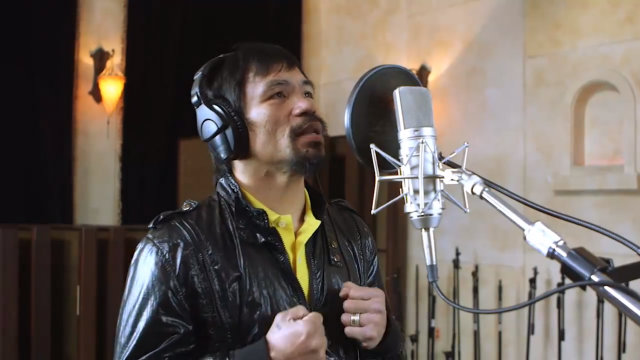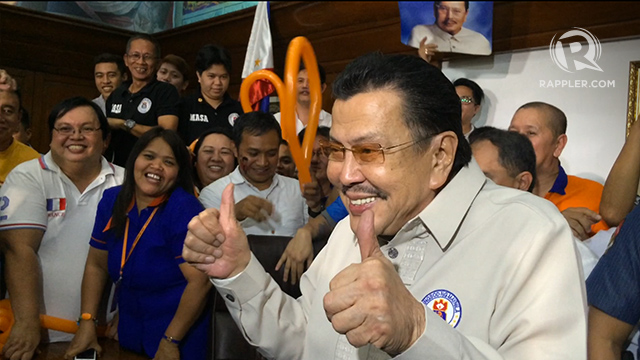
Bato bato sa langit, ang tamaan huwag magalit. Tick everything that applies.
1. The five pillars of Philippine politics are summarized by the 5Gs, which are: god, guns and goons, gold and glory.
God: The separation between Church and State exists only on paper. Politicians are always actively seeking the endorsement of various religious groups, and those organizations are happy to oblige to endorse whomever they see fit to raise the moral ascendancy of Filipinos.
Guns and goons have perennially been used to intimidate voters for them to vote for a certain politician or to not vote at all.
Gold: Every vote counts, so all winning candidates would do their best to recoup their investment during their term in office.
Glory: Winning a public office comes with perks and privileges that would be extended to all members of the politician’s family and even to certain members of their social circle (e.g. diplomatic passports, government vehicle plates).
2. Many references cite that the Philippines is a thriving democracy. However many would say it is an oligarchy, but the crux of the matter is, the Philippines is a borderline mediocracy.
3. Good governance and public service are measured by how many goodie bags and public houses are donated and delivered, respectively, by politicians or aspiring politicians to the poor and destitute.
4. Anyone who can entertain a crowd through dancing or boxing can become an aspiring politician, regardless of whether that someone has a proven track record of public service or not.
5. The Philippine Congress prides itself as the biggest criminal syndicate in the whole country.
6. The Philippine Congress is probably the most diverse in the entire world. It is composed of TV and movie personalities and celebrities, comedians, athletes, criminals, despots, and even former beauty queens.

7. Even plunderers, dictators, ousted and once-exiled corrupt leaders and their families as well as convicted rapists are allowed to run for another shot at a government office.
8. Since the American period, the Philippines has never been a monarchy. However, political dynasties have ruled many parts of the country for decades if not for centuries.
9. A public office is a family business. If an incumbent was no longer eligible to run for public office, his or her immediate relative (wife, son or daughter) would be tapped to run for the same post to secure for the family the same government position. Better yet, several members of the same family would occupy different positions in various branches of the government.
10. Different political parties came about because certain politicians did not get the endorsement from the political party to which he or she once belonged.
11. Politicians switch political parties and allegiances to join the ruling party or coalition. Only time will tell when the word “balimbing” and its conjugates will have their place in the English dictionary.
12. A politician, even after holding the highest government position in the country, would still run for a lower-ranking public office just to become immune from persecution.
13. Surveys are believed and considered to be prophetic even if they were just based on a sample that does not even represent 1% of the voting population. What's worse is the sample might not even be composed of registered voters. Any actual election outcome that deviated from the survey results would mean the elections were rigged.
14. Memes and anything posted on social media sites are regarded without any doubt to be factual and true as long as they put your preferred candidate in a good light and his or her opponents to shame.
15. Those who will lose in the elections will cry foul. No one would concede. Instead all losing candidates would incite and instigate their supporters to rebel or to go to the streets for another "people power revolution" to question the sanctity of the ballots cast and the validity of the election results.
16. Since the impeachment (and eventual acquittal of former US President Bill Clinton in 1998), impeaching high-ranking government officials has become a fad in the Philippines. The Philippines prides itself for having Joseph Estrada as the first-ever Asian head of state to be impeached in 2000. Moreover, the word “impeach” has been inextricably added to the ever-expanding vocabulary of each and every Filipino the same way “kilig” has found its way to the Oxford dictionary.

17. Leftists, activists and radicals will never support any incumbent official unless it’s Joma Sison or any of his anointed ones.
18. Mudslinging has been a hallmark of Philippine elections. It is one of Uncle Sam’s many endearing legacies.
19. While politicians in other parts of the world are debating on issues like stem cell research, environmental protection and cybercrime and security, Philippine politicians are still stuck in the Dark Ages on how to resolve issues like poverty, health and safety, employment and even traffic.
20. It is totally and highly appropriate for any Philippine candidate to stage a stand-up comedy act during a presidential debate.
21. A Philippine candidate can secure votes just by promising the electorate free cakes, false teeth, adult diapers and even Viagra to senior citizens.
22. Choosing and eventually voting for a candidate is always a battle between two lesser evils, so they say.
23. The more expletives that come out of a candidate’s mouth during the campaign, the more supporters he gets.
24. Netizens and citizens alike complain all the time about corruption and the incompetence of public officials, but they still vote for the most incompetent and most corrupt candidates come election time.
25. The whitest, the fairest and the most visually appealing candidates secure the most number of votes most of the time.
26. Filipinos will cast their votes for the candidates whom they think will exact change and enforce discipline, because they cannot change or discipline themselves. - Rappler.com
Aside from being an OFW for the past 7 years, Bertrand is also an OFP, a proud Overseas Filipino Patriot, who remains true to his Filipino roots and identity, no matter where he goes and resides. He is an educator by profession and an aspiring writer and businessman. He hopes to retire as a philanthropist someday.